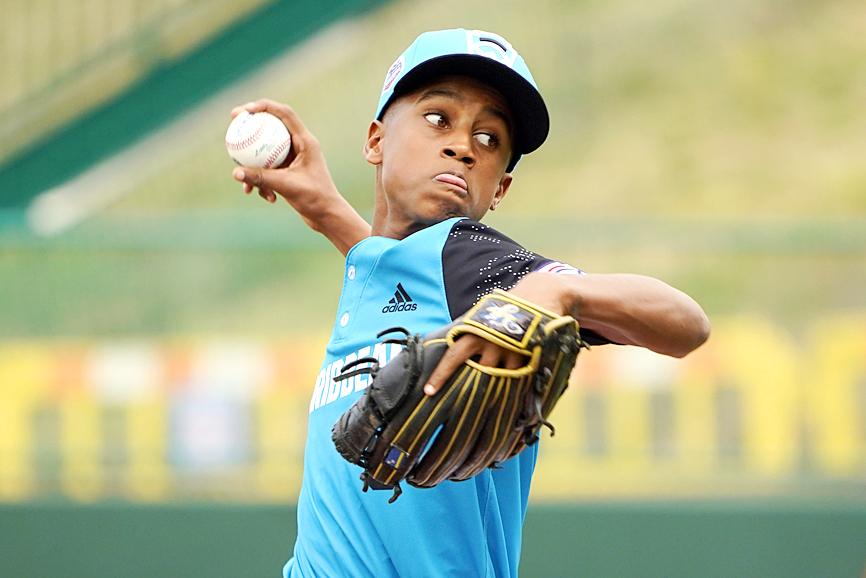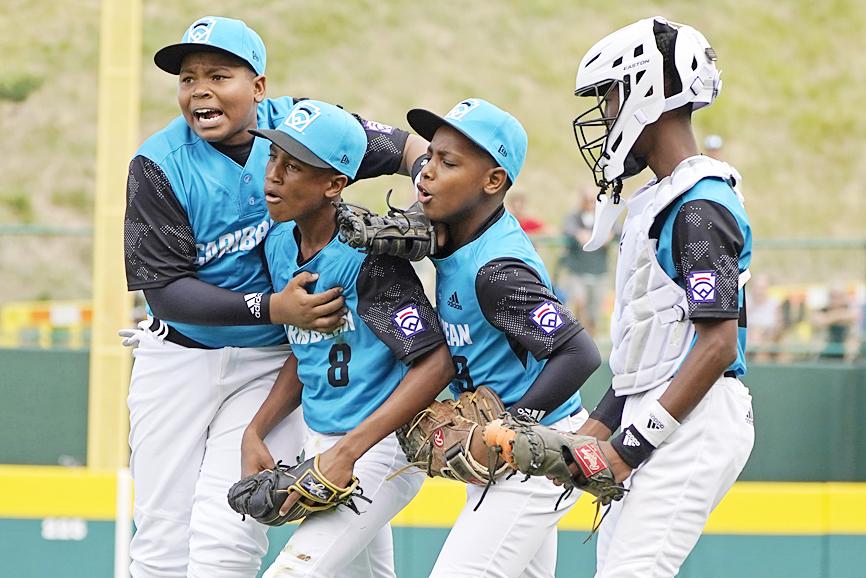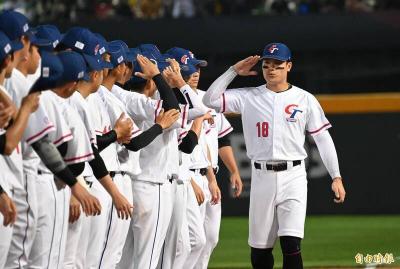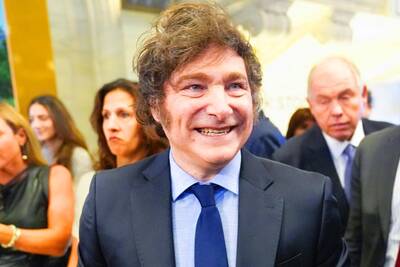If there is a player who best represents just how good Curacao can be at the Little League World Series, it might be Davey-Jay Rijke.
In Curacao’s 2-0 victory on Wednesday over a talented team from Nicaragua, Davey-Jay allowed just two hits while striking out 14 over 5-1/3 innings. He came up with a big hit, a triple in the sixth inning, and scored his team’s insurance run.
Not only that, but with Curacao up just 1-0 and Nicaragua with runners in scoring position in the fourth inning, Davey-Jay laid out to grab a bunt that popped up between the mound and the first base line. As he went back to the dugout, his teammates mobbed him, with one tossing a jacket over his shoulders.

Photo: AP
“You have to keep the guys smiling, just let them have fun,” Zaino Everett, the team’s manager, said afterward. “There are so many pressures in the game to not be that way.”
Davey-Jay works fast, but also stays calm. The batters he faces do not seem to stay so cool facing his 120kph fastball, which comes in about as fast as a 157kph pitch from a major-league mound. Also unnerving to hitters is his tempo. As soon as his foot touches the rubber, Davey-Jay’s windup begins.
“I feel good, my arm feels good, my control is perfect.” Davey-Jay said through an interpreter. “That’s the way Shohei Ohtani [a two-way star of the MLB’s Los Angeles Angels] is looking so I’m trying to be like him.”

Photo: AP
What’s interesting about Curacao is performances like Davey-Jay’s, while remarkable, are not so rare.
Curacao is just off the coast of Venezuela and is small — just 444km2 — with a population of just over 150,000 people.
This year is the country’s 14th visit to South Williamsport, including a 2004 championship with a team who featured future notable big-leaguers such as Jonathan Schoop and Jurickson Profar in a win over undefeated California.
An advantage that the island of Curacao has is the condition of its fields — and that means the relatively poor condition. Baseball diamonds lack the smooth playing surface that grass provides for infields, and instead are left with divots and rocks, forcing infielders to handle frequent bad hops from ground balls.
“That’s why our infielders have the smoothest hands,” said Andy Martina, a broadcaster covering the Little League World Series for fans in Curacao on news Web site Deporte Aktivo.
They were to face Panama Region winners Aguadulce Cabezera Little League from Aguadulce yesterday, another tough team. Panama might be good, but they are certain to face a team that will play well in Curacao, who are represented by the Pabao Little League, the Caribbean Region winners.
“We’ve trained so long and hard to get here, for this year since the [COVID-19] pandemic stopped us from coming the past two years,” Everett said. “We come back, do a good job, and make Curacao proud of us.”
The winners of the Curacao-Panama game are to face Taiwan on Tuesday morning Taiwan time.

The qualifying round of the World Baseball Classic (WBC) is to be held at the Taipei Dome between Feb. 21 and 25, Major League Baseball (MLB) announced today. Taiwan’s group also includes Spain, Nicaragua and South Africa, with two of the four teams advancing onto the 2026 WBC. Taiwan, currently ranked second in the world in the World Baseball Softball Confederation rankings, are favorites to come out of the group, the MLB said in an article announcing the matchups. Last year, Taiwan finished in a five-way tie in their group with two wins and two losses, but finished last on tiebreakers after giving

North Korea’s FIFA Under-17 Women’s World Cup-winning team on Saturday received a heroes’ welcome back in the capital, Pyongyang, with hundreds of people on the streets to celebrate their success. They had defeated Spain on penalties after a 1-1 draw in the U17 World Cup final in the Dominican Republic on Nov. 3. It was the second global title in two months for secretive North Korea — largely closed off to the outside world; they also lifted the FIFA U20 Women’s World Cup in September. Officials and players’ families gathered at Pyongyang International Airport to wave flowers and North Korea flags as the

For King Faisal, a 20-year-old winger from Ghana, the invitation to move to Brazil to play soccer “was a dream.” “I believed when I came here, it would help me change the life of my family and many other people,” he said in Sao Paulo. For the past year and a half, he has been playing on the under-20s squad for Sao Paulo FC, one of South America’s most prominent clubs. He and a small number of other Africans are tearing across pitches in a country known as the biggest producer and exporter of soccer stars in the world, from Pele to Neymar. For

A debate over the soul of soccer is raging in FIFA World Cup holders Argentina, pitting defenders of the social role of the beautiful game against the government of libertarian Argentine President Javier Milei, who wants to turn clubs into for-profit companies. Argentina, which gave the world Diego Maradona and Lionel Messi, is home to some of the world’s most devoted soccer fans — a fact attributed by supporters like Gabriel Nicosia to the clubs’ community outreach. Nicosia is a lifelong supporter of San Lorenzo, a more than 100-year-old first division club based in the working-class Buenos Aires neighborhood of Boedo where